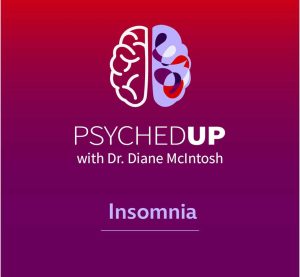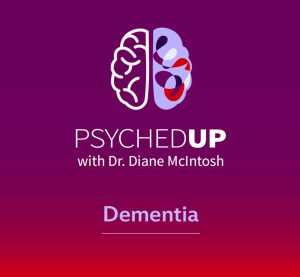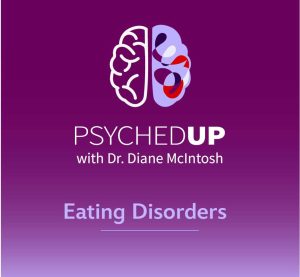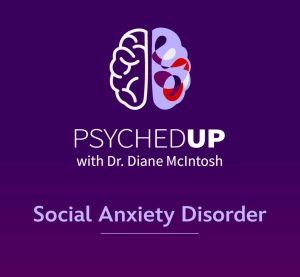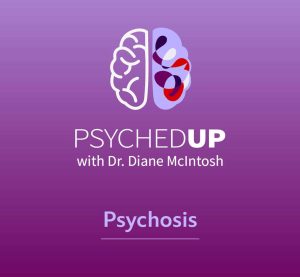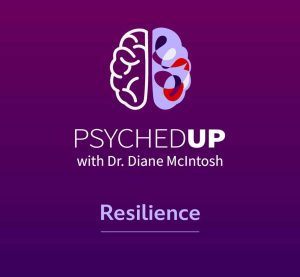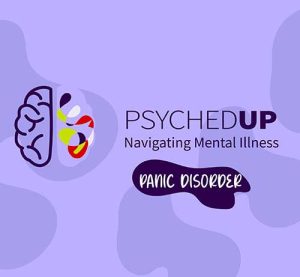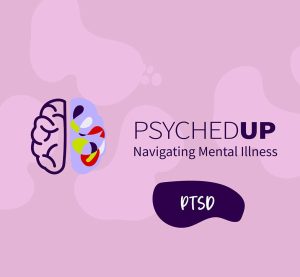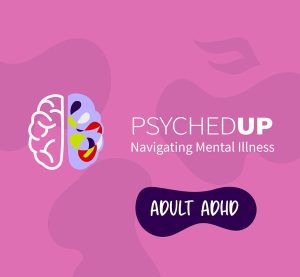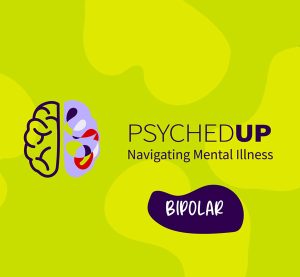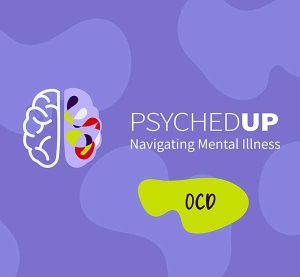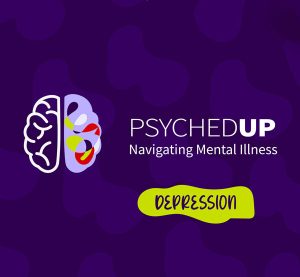
S2 Episode 3: This is Social Anxiety Disorder
Imagine missing out on life’s biggest moments because it feels impossible to show up. That’s the reality for people living with social anxiety disorder but with the right treatment, recovery is possible.
In this episode of PSYCHEDUP, Dr. Diane McIntosh explores social anxiety disorder, a condition that goes far beyond shyness that can quietly steal the joy from everyday life. You’ll hear Hannah’s powerful story, from missing her graduation to struggling through high school, along with expert insights from Dr. McIntosh and psychologist Dr. Randy Mackoff on proven treatment approaches that can help people reclaim their lives.
Listen to This is Social Anxiety Disorder on your favourite platform:
Podcast Transcript:
Diane: Social anxiety disorder is brutal. It can present with physical and emotional symptoms. But more importantly, it can rob people of the most important moments of their lives, like their graduation.
Hannah: I could just see myself standing there in my robe for like three hours by myself, and I just thought, I don’t wanna put myself through that.
Diane: Our guest didn’t go, but avoidance doesn’t solve anything and social media can just multiply the awful feelings of shame and regret.
Hannah: I see lots of my friends from elementary school and high school posting with all of their friends at their graduation. Like, it’s too bad that that wasn’t my experience.
Diane: It really is. Imagine if just being in public or around people you don’t know was so uncomfortable that you’d be willing to miss out on life. This is social anxiety disorder.
On this show, each episode usually focuses on one mental illness. Today we’re going to talk about social anxiety disorder, which is also sometimes called social phobia.
Sometimes social anxiety disorder is dismissed as normal shyness, but the thing is, the true disorder can have a devastating impact on an individual’s functioning and on their life trajectory.
So let’s dig deeper into what social anxiety disorder is. Its causes, symptoms, and how it’s treated.
As a psychiatrist, I want anyone experiencing any mental illness to be able to hear these stories and know there is a path ahead. My goal is to educate, destigmatize, and inspire. I’m Dr. Diane McIntosh. Welcome to PSYCHEDUP.
Diane: One of my favorite Jerry Seinfeld jokes is about how people hate public speaking so much that at a funeral they’d rather be in the casket than give the eulogy. And he’s not far off. In fact, about three quarters of adults will tell you they hate public speaking.
But for most people, when forced, they find their way through it and they get on with their lives. But up to 10% of the adult population is burdened by social anxiety disorder every year. For them, exposing themselves to that kind of scrutiny feels unbearable.
If they manage to do it, it’s terrifying and endured with intense anxiety. Even lower stakes, everyday interactions with strangers, can provoke overwhelming self-consciousness and embarrassment. We can all feel a little awkward sometimes, but a diagnosis of social anxiety requires marked anxiety about one or more social situations where the individual is exposed to possible scrutiny by others leading to humiliation or embarrassment and provoking fear of potentially being rejected or offending others.
The anxiety must occur consistently for at least six months and is owed a proportion to any actual threat posed by the situation.
Situations that provoke social anxiety can be seemingly benign social interactions like meeting new people or just having a conversation, or just the potential of being observed by others. Like eating or drinking in public. It’s especially difficult to be the center of attention, and this is something our guest, Hannah knows all too much about.
Hannah: I guess I, when I was growing up, I went to a very small school, so I got to know my friends really early, and then when I was doing activities like playing soccer and doing gymnastics or dance, I was always doing it with more or less the same people. So I never, I never felt you know, worried or anxious because I had known these people basically my whole life.
Diane: But that changed for Hannah when she moved to a bigger high school, filled with unfamiliar faces. It changed her demeanor.
Hannah: Don’t make eye contact. Uh, don’t say anything unless you have to.
Diane: And then there’s the first day of class self introductions.
Hannah: I always have this sort of out of body experience like somebody else is talking, even though it’s me. It’s like I’m looking from above and I just disassociate. I just hate it so much.
Diane: When you have social anxiety disorder, the fear of being judged, of being seen as boring or dumb can be incredibly difficult to overcome. So difficult that Hannah opted out of any social interaction that she could.
Hannah: I would go through like several days without speaking to anyone, without saying a single word other than maybe like, excuse me or thank you when I got off the bus.
I’d just be like, man, like, what am I doing here? You know? Uh, you just, you stay mute and you go home and like, that’s your school day.
It wasn’t very fun a lot of the time.
Diane: And this, it typically leads to avoidance, trying anything to get out of whatever situations are making you so uncomfortable. As a psychiatrist, what I often hear is regret. A sense of missing out when my patients reflect on the impact of their social anxiety. People tell me, I let the woman of my dreams walk out of my life, or I missed out on my dream job because I couldn’t give that presentation they were asking for. It was ready to go, but I couldn’t make myself do it. Hannah has her own version of this.
Hannah: I decided not to go to my grad because, um, I found it really hard to make friends and, sorry, I dunno why I’m getting emotional.
Diane: Hannah ran through the ceremony in her mind and she opted out.
Hannah: I just thought that it would just be the worst to be standing there surrounded by a bunch of people who I’ve seen in all of my classes. Like I probably know their names, but I’ve never spoken to them. I am scared of talking to them. I could just see myself standing there in my robe for like three hours by myself, not talking to anyone, and then going up on stage, getting my diploma and leaving and I just thought, I don’t wanna put myself through that.
Diane: And social media, it can be a constant reminder of what you’re missing out on. Even if you know what you’re seeing isn’t necessarily the whole story.
Hannah: But I see lots of my friends from like elementary school and high school posting with all of their friends at their graduation. Like, it’s too bad that that wasn’t my experience.
Diane: It’s really heartbreaking. But as you can imagine, fear of humiliation or judgment can really hamper our ability to do the things we want. To reach our true potential. Making friends, finding a mate, forget nailing a job interview, just showing up can feel insurmountable for someone living with social anxiety.
The inability to do these things can have critical consequences, whether it’s avoiding important moments or using substances to endure them.
Hannah: I was socially anxious and that was fairly clear, but I was dealing with it for the most part, and it really only came out when I would avoid, you know, spending time with friends because they were bringing a bunch of other friends that I didn’t know, or I was going to parties and I would compensate, like I would, I would deal with my anxiety by drinking too much.
Diane: It’s safe to say that parties are just not as fun for people living with social anxiety disorder. In fact, it’s where Hannah had her first panic attack.
(SFX: Party sounds)
Hannah: There were a lot of people there that I knew, uh, but I couldn’t find any of them. And I just started feeling so overwhelmed because I was surrounded by a bunch of people that I didn’t know and you’re comparing yourself to everybody. It’s an extremely social, in some ways, competitive environment because people are looking at each other trying to like, figure out what kind of person you are. Maybe like, would you want to date me? That sort of thing. And, uh, yeah, I could just feel myself getting hot. And my heart started racing and I kind of started feeling dizzy. And so I went to the basement bathroom and I just, it was the most uncomfortable thing I’ve ever experienced. You almost feel like you’re gonna die.
Diane: So Hannah’s friends found her. She was okay, but it did shake her. She didn’t go to another party for quite a while, and she also decided that drinking to ease her anxiety wasn’t a healthy way to cope. Using a social lubricant like alcohol or cannabis, it might help in the short term, but smoking weed or drinking before a party, the consequences of that bandage approach can be serious and long lasting.
Some of those consequences are more obvious than others. Being incapacitated with alcohol can result in making unsafe choices and other kinds of vulnerability. Cannabis might take the edge off to start, but over time it can lead to escalating use in order to have that same effect. And when you try to stop, the anxiety can return and be even more severe. Leading you to have to use more. While moving away from self-medication was a positive step for Hannah. It’s not the same as getting treatment. She was still trying to white knuckle her way through her symptoms.
Hannah: I got really sick in grade 11. I had mono, I had strep throat, and I had to go through several rounds of antibiotics and that really screwed with my gut. And so I started having digestive problems. And my digestive problems, I think were slowly getting better, but I had huge anxiety about being bloated all the time.
Diane: Like many young people her age, Hannah, really struggled with a negative body image. It’s safe to say that that bloating didn’t help.
Hannah: And even though my gut was probably healing, every time I started feeling anxious about it, it was kind of like this vicious cycle of the anxiety brought about the gut issues, which brought about more anxiety, which brought about more gut issues.
Um, and that’s when I started getting depressed because I was constantly in pain and constantly anxious about it. And so I felt very isolated. I started not going to school because I was so, like, my stomach was just so upset all the time. And, you just, you never knew when it was gonna act up. And so, yeah, it was very isolating, and very uncomfortable.
Diane: Hannah needed help, and a lot of us do. That’s why I make this show to offer support and resources
If you want to read more about social anxiety disorder or a whole host of other psychiatric disorders, please check out our show notes. I post links with helpful information I’ve developed, as well as listing organizations that offer support.
And if you know someone who might benefit from hearing this episode, please pass it on. I’d love it if you’d rate the show and leave a review that helps other people to find us.
Diane: So how should you manage your social anxiety? There are a lot of ways to find lasting relief, and we’re gonna unpack those options with my favorite psychologist, my friend and colleague, Dr. Randy Mackoff. As you will recall, Randy is an expert in talk therapy, while I as a psychiatrist tend to focus on medication management for serious mental illnesses. Welcome my friend.
Randy: Hello, Diane. Great to see you again.
Diane: Oh, always a pleasure to see you. I would like to ask you some questions about social anxiety from your perspective. How much do you think, or do you think social media has played a role in the development of social anxiety or anxiety disorders writ large.
Randy: I think from my experience, what I see is that often we have uncertainty in our life. And when we’re going through different developmental stages of our life, what happens is that we look for cues in our environment about how we should behave, how we should interact, and those types of things and social media technology has just revolutionized the way we communicate. And as a result of that, what I think people do is they are feeling uncertain, they look to social media and they see something that is impossible for them to obtain. They see something that is out of their reach. And as a result of that, I think, they start to feel even more self-conscious and they feel judged by what they’re watching other people do, and they’re also judging themselves because they have this internal dialogue going on saying, I can’t do that. I’m not good. I’m embarrassed. I’m gonna make a fool of myself. I think it contributes, or it at least exacerbates preexisting social anxiety. And I think this is something that continues to need more work, more research, and also from a therapy perspective, how can we help people with this so that it doesn’t have a negative effect on people, but they can get the gains from social media and grow and remain psychologically well.
Diane: It’s interesting you say that, Randy, because for many people totally walking away from social media, it’s incredibly difficult, maybe impossible. For example, our guest, Hannah, she’s 22, 23, and there have been times when she knew social media was doing her harm.
Hannah: You’re constantly comparing yourself to other people in the everyday world. But then you go home and then you’re on your phone and you’re comparing yourself to hundreds of other people, wondering why you don’t look like that even though you are 14 and they’re 25 with a filter on, and it, it’s just, it’s ridiculous but, I was just beating up on myself all the time.
Diane: Hannah says that her family intervened while they were on vacation.
Hannah: I felt so uncomfortable, like going to the beach and they were like, why are you looking at all of these other people? You are making your time here, which you’re on vacation, you’re with your family in this beautiful place. You love the water. You’re making yourself so unhappy over something that nobody cares about. It’s just not worth it. You should at least try to stop and see if it helps. And it did for sure.
Diane: Instead of cutting herself off completely from social media, Hannah changed the way she used it.
Hannah: Like I stopped following influencers and started following baking accounts or gardening accounts. My relationship with my phone got a whole lot healthier.
Diane: And that goes back to what you said, Randy. It’s all about getting the gains, getting the benefits of social media while staying well, and I know that can be done.
Now, we both know that social anxiety disorder can be highly amenable to talk therapy when you have a really great therapist that you’re working with. So what’s your approach, Randy?
Randy: One thing I talk about is what are the thought processes of somebody with social anxiety, excessive worry, excessive fear. And some of those thoughts or what we call cognitions are worries about being judged, being humiliated, being embarrassed, being rejected, offending other people. You know, like, you know, every time I have an interaction, I think I’ve said something that’s offended somebody, and so therefore I don’t want to interact.
Then what we talk about are ways of, one thing is evaluating those thoughts, and then secondly is a way of modifying those thoughts, sometimes called reframing, sometimes called restructuring, depending on what the actual process is.
But then we talk about what’s the behavior. And the behavior invariably leads to avoidance and with avoidance, of course then we have social isolation, difficulties with work with school, with other important areas of functioning. So the therapeutic approach is to try to reduce the avoidance and gradually increase the exposure. So exposure therapy to that which causes that fear, that worry, that anxiety, at the same time modifying the thoughts.
And then the third thing is, with social anxiety, like all anxiety, there are physical symptoms. Increased heart rate, shallow breathing, some vision distortion in some cases, some or all of these things, panic attacks, and those can be really helped and people can control those through learning some really effective ways of managing that part of our nervous system that causes us to have that fight or flight or freeze type of symptoms. And you know, through breathing, through muscle relaxation, through mindfulness.
And I think treatment takes into consideration all these things, and this is commonly called cognitive behavioral therapy. It has aspects of interpersonal therapy and it also has aspects of what’s called client-centered therapy because the interaction between the psychologist in this case, me and the person I’m working with is a microcosm of the real world.
How about from the medication perspective? Diane, I’ll always love hearing this.
Diane: Well, thank you Randy, for that great lead into medication management, which is, it really is highly dependent on the severity of the symptoms and the circumstances. So if the symptoms are mild to moderate, it’s all about the talk therapy, the work that you can do or, uh, one of your colleagues can do with a patient who is really struggling, but their symptoms are not so severe as to be really impairing their functioning.
But if they are severe and impairing, then the treatment choice is really dependent on how generalizable the symptoms are. By that I mean that if your only challenges are related to having to give a presentation or performance anxiety only, sometimes those physical symptoms like your hands tremoring or your voice tremor, a little bit of sweat. Those are the things that make the anxiety grow. So you can use something as simple as a beta blocker, which those are used to give for people who have high blood pressure taken at a low dose can sometimes just eliminate those tremors or that voice quaver that makes people anxious just for the times that you need it.
Some people use a benzodiazepine like Lorazepam as needed for presentations like that. The problem with that is it can slow down your mental acuity. It can slow your thinking. Beta blockers don’t do that, so that’s why I like them in that circumstance.
Now, if your full-time job is getting up in front of a crowd of people and presenting to them, taking up. Beta blocker every single day, that maybe isn’t going to be the best choice. We know that antidepressants are really good for anxiety, including social anxiety. So if your symptoms are severe, if they’re in many circumstances, this is when you need to think about an antidepressant. And it’s an antidepressant that has serotonin in it. So an SSRI, an SNRI, we know those are the most effective for anxiety. You take them every day. There are newer ones that have fewer side effects, which I tend to prefer because I want people to take their medication that I prescribe for them, and if they’re covered by my patient’s insurance, those are the ones I choose.
But I always recommend, and you started with this Randy CBT, along with the antidepressant.
Randy: Fantastic. Yeah, you know it and you make a really good point there, Diane, like everything that we experience in life, this also too is on a continuum and we can have mild to more moderate to very severe and sometimes it hits a threshold where medication is required, and other times it’s just where psychological treatments, are going to do the trick. And that’s neither good nor bad. It just means that, hey, help is there and, and we can all move forward and, and we’re not living in fear.
Diane: Thank you as always, Randy, for your ability to present with such confidence and clarity and compassion.
Randy: Thank you, Diane.
Diane: There are a lot of misconceptions and misunderstandings about mental illness, so in every episode I try to address at least one of them. I call it my shrink wrap.
As I’ve been thinking about social anxiety disorder for this episode and how it’s often dismissed as normal shyness, it made me think about what normal really is more specifically when do normal life experiences like feeling anxious or down become actual disorders? The answer to that comes down to severity, impact, and persistence.
Now, I think severity is pretty obvious. Experiencing mild symptoms of anxiety, feeling a little down that doesn’t necessarily require professional intervention. Talking it through, reflecting on your experience personally, relying on your own cognitive strengths and resilience usually can help you to get back on track quickly.
Even getting a good sleep or taking a mental break can help you to feel more like yourself. However, if there are lots of physical and emotional anxiety symptoms or the down times are accompanied by other important symptoms, that suggests there’s something more serious going on.
The persistence of symptoms is another factor. For depression you need to have symptoms for most of the day, nearly every day for at least two weeks. For most anxiety disorders, symptoms must be present for months before a diagnosis is considered.
Every psychiatric diagnosis is associated with marked distress and functional impairment. That means the symptoms impair one’s ability to function normally in their usual roles. Whether at work or school, home or socially.
Finally, before making any psychiatric diagnosis, it’s important to rule out another reason for the symptoms, whether it’s a physical disorder, like an underactive thyroid, or due to the effects of a substance, whether recreational or prescription. Only then can I confidently make a psychiatric diagnosis.
Diane: So when Hannah found herself depressed and really unable to go to school, she reached over for help and she started to see a therapist for a while. She also started taking medication and she’s sticking with them.
Hannah: In general, um, it’s, it’s gotten better I’d say. But clearly. It hasn’t helped all the way. I’m not a hundred percent better. I feel like I have, um, I have a better ability to cope with uncomfortable social situations. I’m kind of able to fake it a little bit more.
Diane: But like many disorders, the symptoms ebb and flow. Hannah is returning to school, which has raised some alarm bells for her.
Hannah: One of the hardest days of my year is the first day of school every September. So I am dreading it. You know, people will always say, oh, you’ll make friends. But unfortunately, I’ve had the experience of not making friends and I know how it feels.
You know, I do have a good life. I have a long-term boyfriend. I have other friends. But it is something that does really make me feel like it, it holds me back in my personal life. You’re like, oh God, that sucks. So I think that it might be staring me in the face a lot, uh, this coming year so I could see myself trying to get help again.
Diane: Hannah has nothing to be embarrassed about. And staying open-minded when it comes to treatment is such an important step towards getting better. But before we go, something Hannah said, it really stuck with me because people with social anxiety disorder, they’re uncomfortable and they’re dealing with far more than can be seen on the surface. Sometimes they’re uns, smiling, quiet demeanor that can come across as being aloof or arrogant.
Hannah: Maybe just consider that the person you’re talking to, the new person you’re talking to, doesn’t hate you, doesn’t dislike you in any way. They’re probably just nervous. And it means a lot to them that you’re talking to them.
Diane: Thank you to Hannah for her time and vulnerability in talking about social anxiety disorder. And here’s a little tidbit to take with you.
Hannah: Get off social media, or get off that side of social media that’s telling you that you’re not good enough.
Diane: Those, in my opinion, are words to live by.
I hope you found this episode helpful, and if you know someone who would rather be in the casket than give the eulogy, please share this episode with them. We have extra resources in the show notes, so please take a look and use anything you think might help. I want as many people as possible to benefit from this show, so please rate it and leave a review. This show is produced by Tori Weldon, with strategy by Steve Pratt and Sound Design and our original theme song by Mark Angly of Square Wave Sound. Until next time, I’m Dr. Diane McIntosh. Thanks for listening to PSYCHEDUP.

